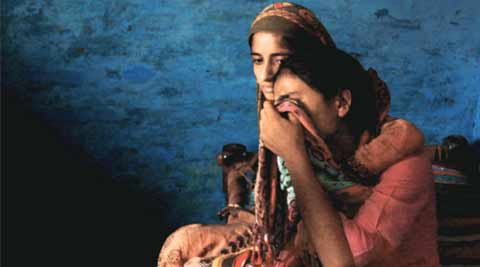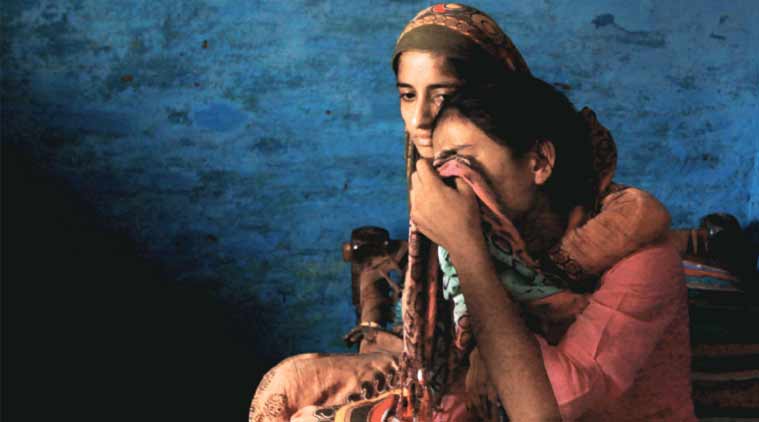Opinion Dadri’s India: The Nathuram Godses of the world are being glorified
PM talks of ‘Digital India’. It will be meaningless so long as ‘Democratic India’ is fearful and in pain.

 Akhlaq’s daughter and her cousin, in Bisara village Wednesday. Akhlaq was killed when a mob attacked his house following rumours that he and his family stored and ate beef. His son, severely injured in the attack, is in hospital. (Express Photo by: Prem Nath Pandey)
Akhlaq’s daughter and her cousin, in Bisara village Wednesday. Akhlaq was killed when a mob attacked his house following rumours that he and his family stored and ate beef. His son, severely injured in the attack, is in hospital. (Express Photo by: Prem Nath Pandey)
We have just celebrated the 146th birth anniversary of Gandhi. The Dadri incident is a chilling reminder of the rising tide of intolerance and hate in the country. Of late, communal intolerance has seen a tremendous upsurge. It seems that the poisonous seed that has been sown is bearing fruit. We are sitting on a simmering cauldron of a communal firestorm.
India won freedom on August 15, 1947 under the leadership of Gandhi. A galaxy of glorious leaders toiled selflessly for freedom. People from all walks of life joined the long and exacting campaign. The British government used every possible ruse to divide the ranks of the freedom movement and debilitate its vigour in order to perpetuate its misrule. Seeds of communal dissension were sown to create Hindu-Muslim discord, which ultimately led to Partition.
[related-post]
Nehru emerged as the natural successor to Gandhi, and became the first prime minister of independent India. It was Nehru’s towering personality, international repute, statesmanlike calibre, immaculate vision, abiding faith in democracy and secular outlook that won him the trust and confidence of the nation. Notwithstanding his stature, the challenges that lay ahead were formidable. The country was partitioned in the name of religion and the communal divide was at its sharpest due to gruesome riots on a monumental scale. The country was bruised and battered when Nehru took the reins and set out to create a republic wedded to the ideals of secularism, rule of law and democracy. The assassination of Gandhi by a fanatic was a body blow. There were fears that the predictions of Winston Churchill and other imperialists were coming true.
It’s not that there have been no communal riots after Independence. Mischief mongers and bigoted fanatics did not vanish from our society. There have been numerous communal incidents in various parts of the country but there was no confusion in the policies of the government on the secular character of our state. Pluralism and equality of all religions remained the bedrock of state policy. Governments and political parties would take swift action to weed out lumpen elements to instil confidence in the people.
Everybody expected the 21st century to be characterised by communal harmony, mutual brotherhood and greater tolerance. Rajiv Gandhi envisioned an India without communalism, casteism, hatred and violence. As ill luck would have it, he did not live long enough to give practical shape to his vision. Successive governments belonging to varied political formations ruled this country after his death, until May 2014. These governments had different ideologies and differed in their style and approach towards various social, economic, political and external issues. However, there was near unanimity on one issue: the secular fabric and pluralistic ethos of the country had
to be preserved.
Today, it seems that this consensus no longer exists. The narrative of communal polarisation is being promoted with impunity; rural areas and small towns have become cauldrons of prejudice and hatred against minorities. A slow fire is kept smouldering and things are brought to a boil every now and then to achieve political ends. Campaigns like “ghar wapsi”, “love jihad”, church attacks, “beti bachao-bahu lao”, “pink revolution” and “beef bans” are being used to add grist to the mill of religious hate. The Nathuram Godses of the world are glorified. A slanderous campaign is run to assassinate the character of Nehru. Invective is hurled on social media at the vice president, triggered by an office bearer of the ruling party. Ministers and MPs of the ruling party find pleasure in issuing inflammatory statements and making provocative speeches, unreprimanded by the top leadership.
On the Dadri mob killing, the culture minister is quoted as saying that those affected will get justice — and that the youth held responsible will also get justice. Sadly, he describes the killing as an “accident”. This brash insensitivity, contempt for the rule of law and bizarre mindset of the minister is not only shocking, but gut-wrenching. Many BJP state leaders openly justify mob justice in the name of “sentiments”. Amidst this worrying scenario, the prime minister and the BJP president maintain a deafening silence — as usual. The BJP leadership gets moved by many things, but the spine-chilling act of mob frenzy is not enough to move them. The ruling party does not miss an opportunity to take a dig at secularism on foreign soil, but heartrending episodes of communal violence at home leave it speechless. Unfortunately, US President Barack Obama is not visiting India anytime soon to admonish us or remind us about our constitutional responsibilities.
The government is obliged to instil confidence in the people. Today, the confidence of a vast section of the population in the institutions of governance is shattered. It is perhaps at its lowest since Partition. This is cause for concern.
I want to remind those at the helm of affairs that in a democracy, the government should have no religion. Its only religion should be to act in accordance with the Constitution. The Constitution ordains the government to ensure rule of law and protect the right to life and liberty. The government must not get swayed by the worldview of the Sangh Parivar, which has a vested interest in diluting the composite culture of the country.
The prime minister makes painstaking efforts to promote the “Digital India” initiative to the world. But all his efforts to woo foreign investors and revive the economy will prove meaningless as long as “Democratic India’’ is in a state of fear and pain.
The time has come for all right-thinking Indians to rise to the occasion and fight the growing menace of religious fundamentalism and communalism. I am reminded of a couplet by Shakeel Badayuni: “Mera azm itna buland hai, ki paraye sholon ka dar nahin/ Mujhe khoaf aatish-e-gul se hai, ye kahin chaman ko jala na de (My determination is so strong, that I am not worried about my external enemy/ I am afraid of the fire emanating from within, which may burn down my country).
The writer, a Congress MP, is leader of opposition in the Rajya Sabha.


